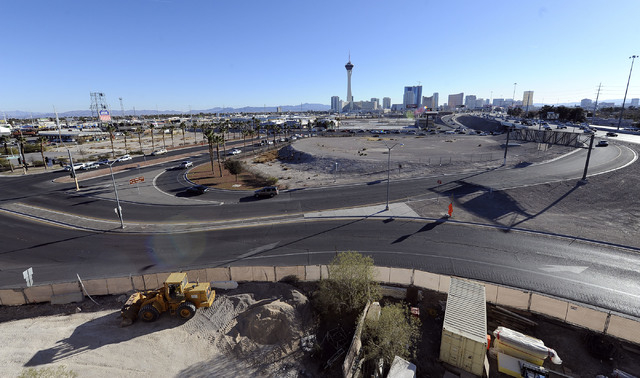Lawmakers OK $100 million bond to help untangle the Spaghetti Bowl
CARSON CITY – A state Transportation Department request for authority to use $100 million in bond proceeds to buy right-of-way for the Interstate 15 widening project called Project Neon won approval Monday from lawmakers.
The approval came despite questions and skepticism from some lawmakers about the public-private partnership the agency would enter as a way to speed construction and build the project in four or five years, with completion in 2020.
Rudy Malfabon, director of the Transportation Department, said the $100 million bond authority is primarily to buy right-of-way for the freeway expansion project between Sahara Avenue and the Spaghetti Bowl. The property will be needed regardless of the financing method used to build it, he told the Legislature’s Interim Finance Committee.
A delay in acquiring right-of-way drive costs higher as property values continue to rise, Malfabon said. He also agreed to come back to the committee to talk more about the proposed public-private partnership.
The agency is still at least a year away from entering into an agreement with one of three construction-financing teams that have shown interest in the project, Malfabon said.
The project will be the largest in the agency’s history and could end up costing $1.3 billion. Earlier this year the state announced a short-list of teams:
- Kiewit-Meridiam NEON Partners – Kiewit Development Company &Meridiam Infrastructure Neon, LLC.
- Las Vegas NEON Ventures – Las Vegas Paving Corporation &Macquarie Capital Group Limited.
- NEON Mobility Group – ACS Infrastructure Development, Inc. &Fengate Capital Management, Ltd. &Star America Fund GP LLC.
While several lawmakers asked questions about the partnership concept, none questioned the need to rebuild the state’s busiest interchange.
The winning team would be paid $200 million on completion of the project in 2020, as well as $34 million a year to maintain it over 35 years.
Transportation officials say building the project in phases as road funding becomes available would take 20 years.
Sen. Michael Roberson, R-Las Vegas, argued in favor of the bond issue and said the concept puts most of the financial risk on the private partner, not the state or taxpayers. If the project isn’t completed to the state Transportation Department’s satisfaction, the builder won’t get paid, he said.
The annual payment of about $34 million can also be reduced if the new improvements are not maintained to the level required by the state, Malfabon said.
The concept of using a public-private partnership, also called a P3, to build the project was approved by the state Transportation Board in June. The board includes Gov. Brian Sandoval and other constitutional officers.
Roberson said the minutes of that June meeting answer many of the questions raised by lawmakers.
“This is good for the state of Nevada and great for Southern Nevada,” he said.
The financing plan will also allow the transportation agency to continue to move ahead with other much-needed road construction, Malfabon said.
Assemblywoman Maggie Carlton, D-Las Vegas, said she has concerns with the new financing plan and asked whether a more traditional funding method could be pursued. A traditional funding plan would make some people more comfortable to the project, she said.
There could be huge issues for the state if the contractor defaults on the project, said Carlton, who cast the lone no vote on the bonding request.
Assembly Speaker Marilyn Kirkpatrick, D-North Las Vegas, supported the decision to approve the bonding authority, based on assurances that the Transportation Department will commit to work with lawmakers to resolve any concerns.
The Transportation Board will continue to determine how the project moves forward, with the state Board of Finance reviewing the bonding request.
Contact Capital Bureau reporter Sean Whaley at swhaley@review-journal.com or 775-687-3900. Follow him on Twitter @seanw801.






















